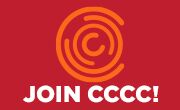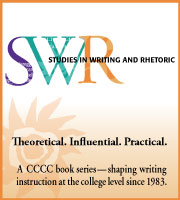Since 1994, the Caucus on Intellectual Property and Composition/Communication Studies (CCCC-IP) has sponsored explorations of intellectual property issues pertinent to teachers, scholars, and students. Our meeting is open to those interested in these explorations.
Meeting in roundtables, participants discuss topics such as plagiarism and authorship, student and teacher IP rights, open access and open source policies, and best practices in teaching students and instructors about IP. Roundtable speakers provide overviews of their topics, and participants then create action plans, develop lobbying strategies, or produce documents for political, professional, and pedagogical use. At the end of the workshop, participants reconvene to share their plans and recommendations for future action.
The CCCC-IP Caucus meeting will take place on Wednesday, April 6 from 2:00-5:30pm; we are listed as follows in the program catalog under Wednesday workshops:
Intellectual Property in Composition Studies
Room M301, Marquis Level
2:00–5:30 p.m.
We have a number of exciting roundtable topics this year. The IP Caucus meeting is a great way to kick off the convention, especially one dedicated to exploring the “relations” of contested knowledge and space. Come join us!
Roundtable 1: Implications of the DMCA for Teaching and Learning
Since its passage in 1998, the Digital Millennium Copyright Act, which criminalizes the circumvention of Digital Rights Management and seeks to restrict the use of copyrighted material on the Internet, has been invoked in ways that go beyond the legitimate protection of intellectual property rights. The default setting, as it were, is to bar all use, regardless of whether it is fair use. As documented by the Electronic Freedom Foundation, the DMCA has been used as a way of stifling critique and as a tool that companies can wield against competitors. Such outcomes may not have been intended by the framers of the DMCA, but their existence has implications for students and educators, whether on the K-12 or college level. This roundtable will survey recent developments in the realm of DMCA as they affect education, with an eye toward proposing actions that the caucus can take to ameliorate the impact of the act.
Roundtable 2: Students’ Rights to Their Own Writing—and the Writing of Others
This roundtable will focus on how new media technologies complicate traditional conceptualizations and definitions of intellectual property. Students use listservs, blogs, wikis, and social networking sites more frequently as both venues and source material for their texts, often copying and pasting the material of others into their own work without attribution. Additionally, the traditional concept of ownership becomes fuzzy when a number of (unrelated) individuals contribute to an electronic document that continually undergoes revision. Participants will discuss how the refiguring of textual creation necessitates new methods of conceiving of and teaching about intellectual property.
Roundtable 3: Current Research and Publications on Intellectual Property Issues.
This roundtable will discuss studies currently being conducted by members of the IP caucus; special issues of journals that focus on IP, such as TCQ, Technical Communication, and Computers and Composition; edited collections created by IP caucus members; new curricular developments; and new books or books in progress. Roundtable participants will also formulate a plan-of-action for future studies, research, curriculum, and publications.
Roundtable 4: Teaching IP with RiP!
This roundtable will ultimately seek to identify some “best practices” of teaching students about IP by using Brett Gaylor’s RiP! A Remix Manifesto in the classroom. Often, plagiarism, fair use, and remix are introduced as restrictions in a writing classroom, rather than as concepts to be explored and understood. Following the theme of the conference, roundtable participants will formulate strategies to help student composers (and teachers of composition) identify these “contested spaces” and “contested knowledge” in the classroom so that they can create (rather than feel constrained) within those spaces.
Roundtable 5: Tracking Open Access/Fair Use Court Cases and Legislation
Recent legislative acts (e.g., NIH Public Access, 2008) and court cases (e.g., Salinger et al. v. John Doe et al., 2009) are redefining open access and fair use. This roundtable will update participants about the latest developments in legal and legislative venues, and will discuss ways the IP Caucus/IP Committee may contribute to these processes.
This month’s report is submitted by:
Traci A. Zimmerman Ph.D., Chair, Intellectual Property Caucus
Associate Professor
School of Writing, Rhetoric & Technical Communication
James Madison University












